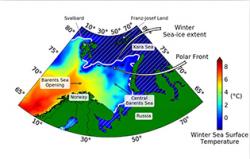Extreme weather in Europe linked to less sea ice and warming in the Barents Sea
![]() This article by Yueng-Djern Lenn, Senior Lecturer in Physical Oceanography, Benjamin Barton, PhD Researcher, School of Ocean Sciences and Camille Lique, Research scientist in physical oceanography, Institut Français de Recherche pour l’Exploitation de la Mer (Ifremer) was originally published on . Read the .
This article by Yueng-Djern Lenn, Senior Lecturer in Physical Oceanography, Benjamin Barton, PhD Researcher, School of Ocean Sciences and Camille Lique, Research scientist in physical oceanography, Institut Français de Recherche pour l’Exploitation de la Mer (Ifremer) was originally published on . Read the .
The cold, remote Arctic Ocean and its surrounding marginal seas have experienced climate change at a rate not seen at lower latitudes. Warming air, land and sea temperatures, and large declines in seasonal Arctic sea ice cover are all symptoms of the changing Arctic climate. Although these changes are occurring in relatively remote locations, there is Arctic sea ice retreat to over .
As sea ice declines, areas of open water increase, allowing the ocean to lose more heat to the atmosphere. Heat lost from the ocean to the atmosphere reduces the atmospheric pressure which provides more energy to storms and increases their cloud content through evaporation.
Water flowing north from the Atlantic Ocean provides a major source of heat to the Arctic Ocean and surrounding continental shelf seas. While the Atlantic Water (the particular water mass in the Arctic ocean) carries enough heat to melt all the floating Arctic sea ice in less than five years, it is currently insulated from the surface by a lighter, fresher layer of water over most of the central Arctic Ocean.
However, this paradigm appears to be changing. North of Svalbard, Atlantic Water heat has been mixed up towards the surface, resulting in increased surface heat lost to the atmosphere over the ever greater area of open ocean. This change has recently been of sea ice loss eastwards.
Barents Sea changes
A key Arctic region for Atlantic Water heat exchange with the atmosphere is the Barents Sea. Atlantic Water flowing east through the Barents Sea Opening – between Bear Island, and northern Norway – remains exposed to the atmosphere as it circulates through the central Barents Sea. It gradually cools and becomes fresher (due to sea ice melting) as it moves eastwards to the Kara Sea.
In the Barents Sea, sea ice forms every autumn and melts in late spring/summer. In the northern part of the sea, a north-south change from cold to warm sea surface temperatures signals the presence of the Polar Front, which separates cold Arctic water from the warm Atlantic water. The meeting of the two water masses, its location and the temperature difference across it reflects changes in Barents Sea circulation.
During years with low seasonal sea ice concentrations (when there’s more heat loss from more exposed open water), the north-south differences in atmospheric temperatures across the Barents Sea are reduced. These conditions have been linked to travelling further south into western Europe, instead of their tendency to move eastwards towards Siberia, as well as more frequent .
Ice and weather
, we looked at satellite measurements of sea ice and sea surface temperature, to determine how ocean and ice conditions have evolved between 1985 and the end of 2016. We found that prior to 2005, sea ice extended south of the Polar Front every winter, but that since 2005 this has not been the case.
At the same time, the sea surface temperature difference across the Polar Front has increased, with southern temperatures increasing at a faster rate than those to the north. The average between 1985 and 2004 was -1.2°C in the north and 1.5°C in the south, while between 2005 and 2016 it was -0.6°C in the north and 2.6°C in the south. Clearly, from 2005 the Barents Sea has become too warm for sea ice to exist south of the Polar Front. The question then is why is the Barents Sea getting warmer?

We believe that this represents a long-term shift in the climate of the Barents Sea, a region already identified as influential on lower-latitude European weather. Furthermore, we believe that the 2005 regime shift we observed over the Barents Sea may have contributed to the increasingly frequent extreme weather events experienced over Europe in the past decade or so.
Publication date: 30 August 2018
